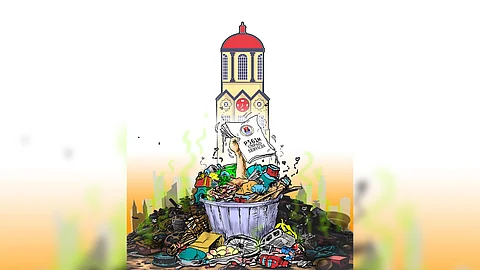
- NEWS
- the EDIT
- COMMENTARY
- BUSINESS
- LIFE
- SHOW
- ACTION
- GLOBAL GOALS
- SNAPS
- DYARYO TIRADA
- MORE

Manila, the vibrant and densely populated capital of the Philippines, is now grappling with an environmental and public health crisis: uncollected garbage piling up in its streets.
This alarming situation stemmed from the Manila City government’s failure to settle its over P561-million debt to garbage collector Leonel Waste Management Corporation, which led to the contractor’s refusal to renew its agreement or participate in a new bidding.
As the New Year commenced, Manileños were greeted not by festive tidings but by the stench of decaying waste and overflowing bins. This predicament highlights a significant breakdown in governance and underscores the urgent need for efficient waste management systems.
The roots of this crisis can be traced back to September of the previous year when Leonel Waste Management informed the city government of its substantial arrears. Despite the early warning, the issue was left unresolved, with no clear indication that the government would meet its financial obligation.
Consequently, Leonel Waste Management opted out of bidding for a new contract until it received payment for its past services. This decision effectively halted garbage collection across Manila starting 1 January.
The refusal of the contractor was not without justification. Operating a waste management service in a metropolis like Manila involves significant logistical and financial commitments.
Equipment maintenance, fuel and manpower costs are all substantial expenses. Without timely payments, service providers face insurmountable challenges in sustaining operations.
Leonel’s decision to withhold participation in the bidding process reflects the frustration of private contractors who are often left holding the short end of the stick when government agencies fail to honor their obligations.
The most visible outcome of this impasse is the mounting garbage on Manila’s streets. With no organized system to collect and dispose of the waste, garbage bags now line thoroughfares, clogging drains and creating eyesores in residential and commercial areas.
This not only tarnishes the city’s image but poses severe health risks. Piles of uncollected trash become breeding grounds for rats, cockroaches, and other disease-carrying pests.
Furthermore, the decomposition of organic waste releases methane, a potent greenhouse gas, exacerbating the city’s carbon footprint.
Residents have expressed growing frustration over the lack of decisive action from the local authorities. Some communities have resorted to burning their garbage, further compounding the environmental hazard through air pollution. Others have begun dumping the waste in vacant lots and waterways, increasing the risk of flooding and water contamination.
This crisis lays bare the inefficiencies in the city’s governance. The timely payment of obligations is a fundamental aspect of maintaining public services. The Manila City government’s failure to address its debt to Leonel Waste Management highlights a lack of fiscal discipline and planning.
Moreover, the absence of contingency measures exacerbates the situation. The city government should have ensured that an alternate contractor would be ready to step in or devised an interim waste management solution. The fact that no such plan was implemented demonstrates poor foresight and management.
Resolving the crisis requires an immediate and concerted effort. First, the city government must prioritize settling its outstanding debt to Leonel Waste Management. Rebuilding trust with contractors is essential to ensuring the continuity of public services. Second, an open and transparent bidding process should be conducted to secure a new waste management provider, with stringent conditions to prevent similar issues in the future.
Long-term solutions should also be explored. These include investing in sustainable waste management systems such as material recovery facilities and composting programs. Educating residents on proper waste segregation and recycling can also reduce the volume of trash requiring collection.
The garbage crisis in Manila is a stark reminder of the consequences of neglect and mismanagement. As the city’s leaders scramble to address this issue, they must learn from this debacle to build a more resilient and accountable governance framework. For Manila’s residents, the hope is not just for cleaner streets but for a government that prioritizes their welfare and the city’s future.
